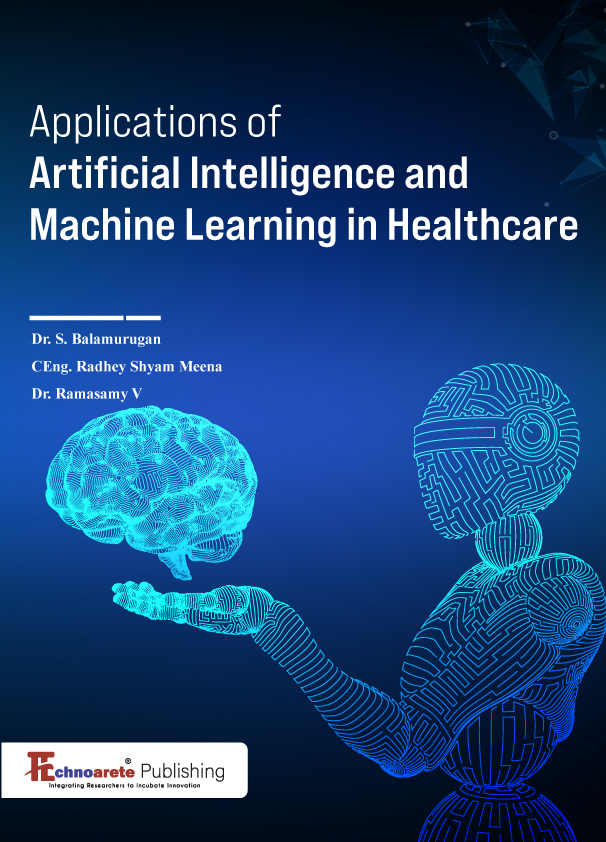Role of Artificial Intelligence in Mental Healthcare
Dr. Shivangini Saxena
Electronics & Communication Engg. Department, SAGE University, Indore, Madhya Pradesh, India
Corresponding Author: shivanginisaxena23@gmail.com
Prof. Madhvi Singh Bhanwar
Electronics & Communication Engg. Department, SAGE University, Indore, Madhya Pradesh, India
Corresponding Author: madhvisinghbhanwar@gmail.com
Dr. Pallavi Pahadiya
Electronics & Communication Engg. Department, SAGE University, Indore, Madhya Pradesh, India
Corresponding Author: pallavi_19_2000@yahool.com
Dr. Akhilesh Upadhyay
Dean Engineering, HOI, SIRT, SAGE University, Indore, Madhya Pradesh, India
Corresponding Author:hoi.sirt@sageuniversity.in
Abstract :
Artificial Intelligence (AI) has found a lot of scope in diversified applications including health care systems. Due to the rapid increase in digitization and change in the life style lot of people are facing health care issues like mental diseases. Now the days AI is use to help health care members with its analysis like tumor, cyst, cancer, dermatology issues etc. Looking towards the increasing cases there is a urgent demand of AI in medical specially in mental health care.Many electronic systems are used for the health data analysis so the combination of AI within system can help the patients. Due to the pandemic there is increase in health issues and it has pushed the limits for increase in need of mental health care system using AI. Since AI can provide services like personalize care, remote access, guiding patient, online doctor’s advice etc. AI can be used to identify the individual with high risk also it can provide intervention to treat and prevent mental illness. This work presents the comparison and role of different AI based mental healthcare analysis. As AI using electronic health record, brain imaging and other sensing system can predict the issues in individual and help to monitor patient’s progress and helps the doctor to alter treatment if needed and can help in decrease in suicidal issues. Apart from indentifying the particular issue in patient AI can help the patient to assign the right therapist as per his/her problem. Thus the patient is been given with right therapy at right time. It can also, guide the care taker to give medicine at given time. Natural language processing and Machine learning can be used to find the problem in individual along with its social media presence can be an effective tool to identify once mental health. This information can assist the healthcare practitioner to identify particular problem and guide for treatment. There is also a limitation for collecting data and training the AI based system which is discussed in this work. Along with that the technology limitation and challenges are well described.
Reference
[1] Lee, E. E., Torous, J., De Choudhury, M., Depp, C. A., Graham, S. A., Kim, H. C., ... & Jeste, D. V. (2021). Artificial intelligence for mental health care: clinical applications, barriers, facilitators, and artificial wisdom. Biological Psychiatry: Cognitive Neuroscience and Neuroimaging, 6(9), 856-864
[2] https://healthitanalytics.com/features/what-role-could-artificial-intelligence-play-in- mental-healthcare.
[3] https://www.pinterest.com/pin/721138959067149797/
[4] https://propane.agency/lux/benefits-of-artificial-intelligence-the-future-of-healthcare/
[5] https://www.everestgrp.com/2018-02-artificial-intelligence-democratizing-mental-health- sherpas-blue-shirts-43745.html/.
[6] https://www.everestgrp.com/2018-02-artificial-intelligence-democratizing-mental-health- sherpas-blue-shirts-43745.html/.
[6] https://www.everestgrp.com/2018-02-artificial-intelligence-democratizing-mental-health- sherpas-blue-shirts-43745.html/.
[7] https://www.techtarget.com/searchenterpriseai/definition/machine-learning- ML#:~:text=Machine%20learning%20(ML)%20is%20a,to%20predict%20new%20outpu t%20values.
[8] https://mlfromscratch.com/neural-networks-explained/#/
[9] Graham, S., Depp, C., Lee, E. E., Nebeker, C., Tu, X., Kim, H. C., & Jeste, D. V. (2019). Artificial intelligence for mental health and mental illnesses: an overview. Current psychiatry reports, 21(11), 1-18.
[10] https://www.everestgrp.com/2018-02-artificial-intelligence-democratizing-mental health- sherpas-blue-shirts-43745.html/Sujita Kumar Kar (King George's Medical University), Shailendra K. Saxena, In book: Applications of Artificial Intelligence in COVID-19 (pp.327-343), September 2021,DOI:10.1007/978-981-15-7317-0_17.
[11] Pandemic increases mental health issues and drives growth in digital therapeutics Dec. 21, 2020 Dec. 21, 2020, By Annette Boyle.
[12] Ćosić, K., Popović, S., Šarlija, M., Kesedžić, I., & Jovanovic, T. (2020). Artificial intelligence in prediction of mental health disorders induced by the COVID-19 pandemic among health care workers. Croatian medical journal, 61(3), 279.
[13] Cecula, P., Yu, J., Dawoodbhoy, F. M., Delaney, J., Tan, J., Peacock, I., & Cox, B. (2021). Applications of artificial intelligence to improve patient flow on mental health inpatient units-Narrative literature review. Heliyon, 7(4), e06626.One in four people suffer from mental illness globally – can AI help? By Vihan Sanyal, September 12, 2018.
[14] https://www.pwc.com/gx/en/industries/healthcare/publications/ai-robotics-new health/transforming-healthcare.html
[15] https://www.novatiosolutions.com/10-common-applications-artificial-intelligence- healthcare/
[16] https://www.weforum.org/agenda/2021/12/ai-mental-health-cbt-therapy/

